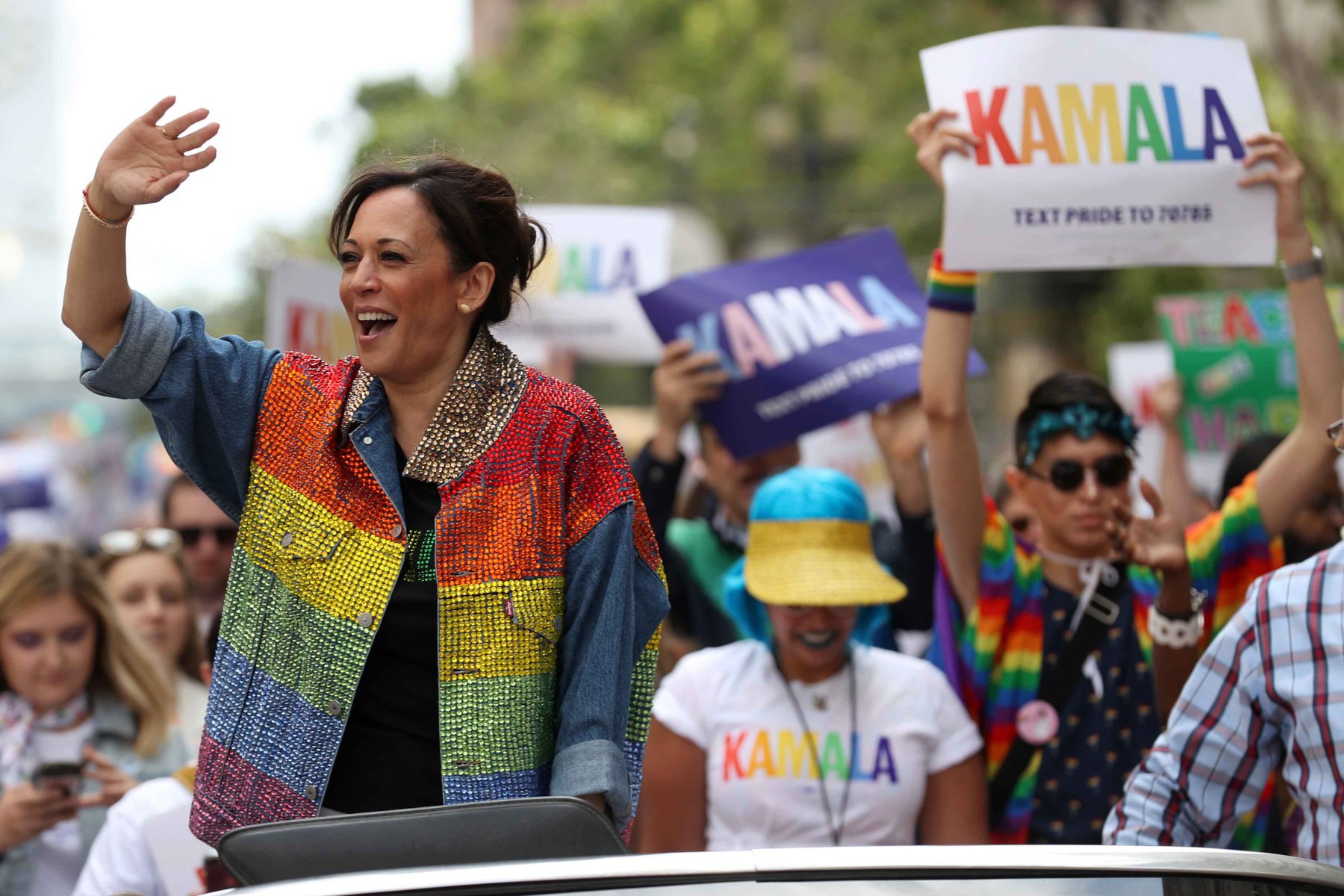Your trusted source for contextualizing LGBTQ+ and Election 2024 news. Sign up for our daily newsletter.
Five years ago, Democratic presidential primary hopeful Kamala Harris stepped onto a stage at a CNN LGBTQ+ town hall in Los Angeles.
“My pronouns are she, her and hers,” Harris said in her introduction.
Offering her pronouns, which wasn’t nearly as commonplace in 2019 as it is now, showed solidarity with transgender and nonbinary Americans. It was a simple but impactful gesture for a community in the midst of an unprecedented homicide crisis, whose rights and humanity had been challenged by former President Donald Trump, who was in office at the time, and other Republicans
In standing shoulder to shoulder with transgender people, Harris began to shift a relationship that had been dogged by decisions of her past, like her support for bills cracking down on sex work during her time as a prosecutor in San Francisco and, while California’s attorney general, her state’s opposition to gender-affirming care for an incarcerated transgender woman in 2015.
Today, Black transgender women, some of the same people who questioned her candidacy five years ago, are supporting Harris on and off the campaign trail. One way they have shown up is by raising money and drumming up support, like a Zoom call in August that was joined by more than 1,000 transgender people, the brainchild of veteran Black trans activist Zahara Bassett.
“I felt that we need to let people know that our voices are at the ballot,” Bassett said. “When we speak to you about our rights, about our visibility of being here, that needs to be respected.”
Bassett enlisted the help of several trans luminaries, including Precious Davis, who had long heard criticism of Harris among her LGBTQ+ peers. Davis, chief strategy officer of Center on Halsted, Chicago’s largest LGBTQ+ community center, said she knew it would be critical for Black trans women to show up for Harris, in part as a way of signaling to Black trans women and queer communities they had permission to vote for the vice president.
“We are a part of a community who have the most to lose,” Davis said of Black trans women. “Our rights and freedom are at stake. We have seen Donald Trump’s attacks against the trans community time and time again.”
Many LGBTQ+ advocates have argued that even if Harris has room for growth on LGBTQ+ issues, it’s nearly impossible to compare her with Trump, who regularly misgenders trans women and refers to trans people as “insane.”
“I will say that I would rather have a fighting chance with her than have no chance at all with Trump,” said Hope Giselle-Godsey, executive director of the National Trans Visibility March, another organizer of the Zoom call for Harris.
While she was roundly criticized four years ago for mixing up language in referring to transgender women, overall, Harris’ record on LGBTQ+ rights is largely viewed positively. She provided some of the earliest support for marriage equality of any presidential hopeful when, as district attorney in San Francisco, in 2004 she officiated a same-sex wedding in California. She also opposed so-called gay and trans “panic defenses,” where perpetrators attempted to claim that fear or disgust of LGBTQ+ people was reasonable motivation for attacking them.
She lost significant ground going into 2020 after her support of FOSTA/SESTA, a 2018 package of bills that aimed to crack down on websites used by sex workers. Transgender people are disproportionately forced into underground economies like sex work due to a lack of employment opportunities.
Trump, however, has fared much worse. During his four years as president, the National Center for Transgender Equality labeled his cabinet the “Discrimination Administration” and the media advocacy group GLAAD logged 210 attacks on queer people. He also barred transgender people from serving in the military, banned Pride flag displays at embassies and gutted transgender health care protections under the Affordable Care Act, among other things.
Channyn Lynn Parker, CEO of the Brave Space Alliance, which serves trans and gender nonconforming youth on the south and west sides of Chicago, speaks about both candidates with resignation. She, too, helped organize the Zoom for Harris, though less enthusiastically than her peers.
Parker has worked with street-based and unhoused youth for more than 10 years and has seen Democratic candidates come and go, all of them with different promises for the community; for example, Biden pledged to trans kids that he “had their backs.”
Meanwhile, the kids she works with still face the same challenges. Many are still kicked out of their homes by their own parents and they’re particularly vulnerable to the anti-trans laws and hate that has also flourished across the country.
“I have never seen a candidate where I feel completely safe, and I’ve ever been able to breathe a full sigh of relief, never,” Parker said. “So, I don’t know if Kamala is going to be any different in that regard.”
Black trans women are a small subset of the transgender voters, who make up a small portion of the electorate. An estimated 825,100 transgender adults of all races will be eligible to vote in November, according to the Williams Institute at the UCLA School of Law. As of last year, 161 million Americans were registered to vote.
Queer Americans now make up 7.6 percent of the overall population, Gallup reports. According to GLAAD, 94 percent of those LGBTQ+ Americans are motivated to vote. Black trans women have an outsized influence on these voters, a group that tends to lean heavily Democratic.
In recent years, advocates have invested heavily in giving credit to Black trans activists for leading the charge at the Stonewall uprising in 1969, where queer people famously fought back against homophobic policing in New York City.
At the same time, Black trans women have been overrepresented in the numbers of trans homicide victims and often underrepresented in the media.
At the 2019 LGBTQ+ Town Hall, where Harris introduced herself with her pronouns, Black trans women made headlines by interrupting the event repeatedly, noting that not a single Black trans woman had been invited to ask candidates a question.
The town hall also included a gaffe: Immediately after Harris shared her pronouns, CNN’s Chris Cuomo replied, “Mine too.” To transgender people, the moment highlighted how, even at an event centered on LGBTQ+ communities, transgender issues could become an afterthought. And in the four years since, Trump and his running mate, Ohio Sen. JD Vance, have repeatedly attacked transgender people; 176 anti-trans bills have become law; and none of the debates have delved meaningfully into LGBTQ+ issues.
The Black trans women backing Harris see the setbacks — and also an opportunity if Harris wins. Davis said she is ready to lobby Harris on trans issues the moment Harris takes the oath of office. Bassett has at the ready a wish list of policies that would make gender-affirming care more accessible and less stigmatized.
And Parker is clear about one thing: Supporting a candidate doesn’t mean agreeing with them unconditionally. It means challenging them to be better.
“We’re going to provide you with all the necessary tools and resources and individuals to help you to get this right,” she said. “If you don’t use those tools, meaning the individuals who are providing you with the level of access and education needed, then shame on you.”
To check your voter registration status or to get more information about registering to vote, text 19thnews to 26797.





